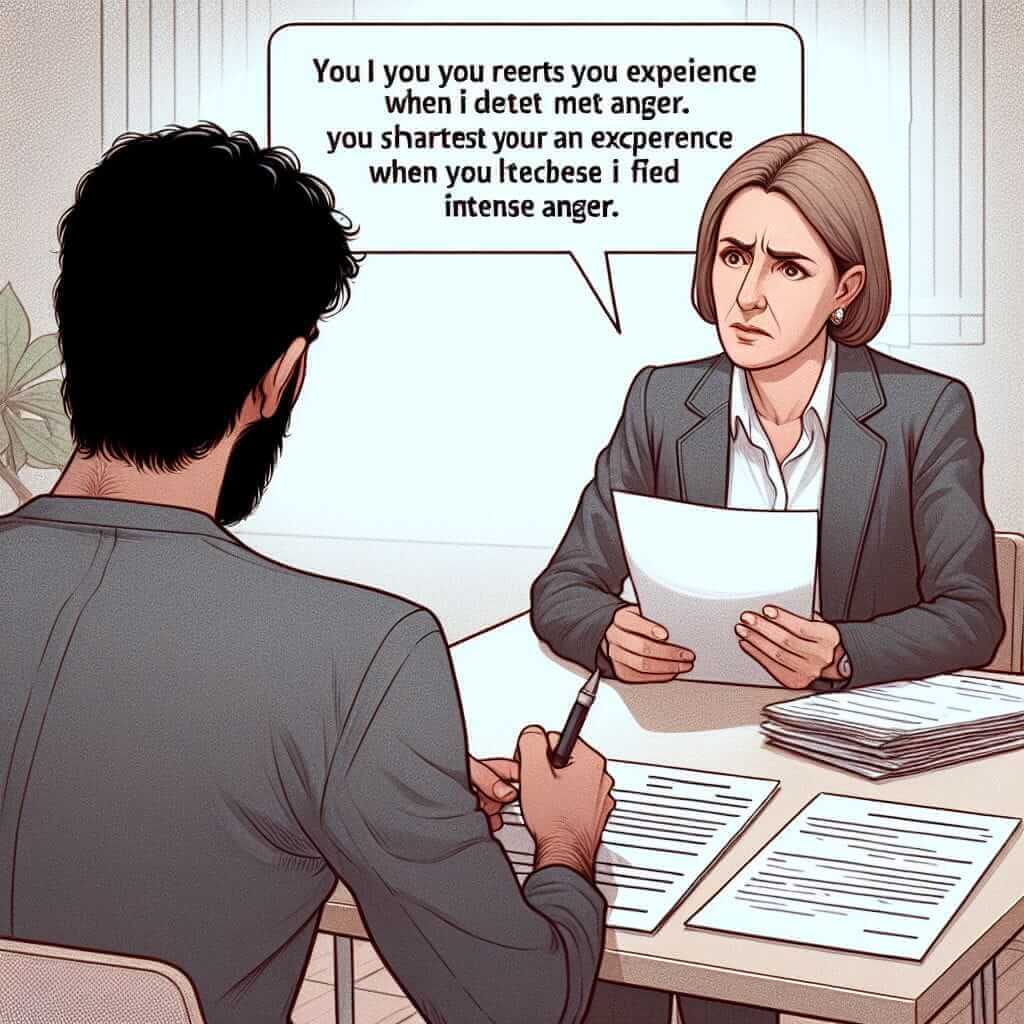The IELTS speaking exam is designed to assess a range of skills you’ll need to communicate effectively in an English-speaking environment. The speaking test consists of three parts: Part 1 (Introduction and Interview), Part 2 (Long Turn), and Part 3 (Two-way Discussion). The examiner will evaluate your fluency, coherence, lexical resource, grammatical range, and pronunciation. One commonly asked question is “Describe a time when you were angry.” Understanding this topic and mastering how to respond can significantly impact your score.
Part 1: Introduction and Interview
In this part, the examiner asks general questions about yourself and a range of familiar topics. Here are some questions the examiner might ask:
- Do you often get angry?
- What usually makes you angry?
- How do you control your anger?
- Can you remember the last time you were angry?
Example Question and Suggested Answer
Question: Do you often get angry?
Suggested Answer:
“In general, I consider myself a calm and collected person, but like everyone else, I do get angry from time to time. For instance, when people are being disrespectful or when someone breaks my trust, it really gets on my nerves. However, I always try to manage my anger constructively rather than letting it take over.”
Part 2: Long Turn
In Part 2, you’re given a cue card with a topic, and you’ll need to speak about it for 1-2 minutes. Below is a sample cue card based on the keyword “Describe a time when you were angry”:
Sample Cue Card
Describe a time when you were angry. You should say:
- When it happened
- What made you angry
- How you felt
- And explain how you handled this situation
Suggested Answer
“One specific instance that comes to mind when I was really angry happened about a year ago. It was a regular day at work, but it took a dramatic turn when one of my colleagues purposefully took credit for a project I had worked very hard on. This project was significant to our team’s success and required intricate planning and relentless effort. When I found out about this disheartening situation, I felt both betrayed and infuriated.
I was so filled with anger at that moment that I had to excuse myself and take a few minutes to gather my thoughts. I decided not to act out of anger but to address the situation professionally. I brought it up with my manager, providing all the evidence of my hard work and contributions. Luckily, my manager understood and took appropriate action. This episode taught me the importance of maintaining composure and handling conflicts diplomatically.**”
Follow-up Questions and Answers
Question: How did you feel after confronting your colleague?
Suggested Answer:
“To be honest, I felt relieved and somewhat proud of myself for managing the situation maturely. Instead of letting my anger control me, I managed to handle it in a way that resolved the issue without creating further conflict.”
Question: Do you think being angry is always a negative emotion?
Suggested Answer:
“Not necessarily. While anger is generally viewed negatively, I believe it can serve as a powerful motivating force if channeled correctly. It can drive you to make important changes and address issues that are bothering you.”
Part 3: Two-way Discussion
In this final part, the examiner will ask more abstract questions related to Part 2 to explore your ability to discuss and extrapolate on broader issues.
Sample Discussion Points
Question: What kinds of situations generally make people angry in your opinion?
Suggested Answer:
“I think situations involving injustice, discrimination, and dishonesty often evoke anger. People also get angry when they feel their personal boundaries are violated or when they face undue criticism. Essentially, any situation where individuals feel their self-respect is compromised can trigger anger.”
Question: Can anger be beneficial? In what way?
Suggested Answer:
“Yes, anger can be beneficial if managed properly. It can motivate individuals to seek justice and rectify wrongs. For example, movements for social change often start with a collective sense of anger towards social injustices. This emotion can galvanize people into action to bring about positive change.”
Essential Vocabulary and Structures for a High Score
Key Vocabulary
- Irritated [ˈɪr.ɪ.teɪ.tɪd]: Annoyed or angered.
- Example: “I get irritated when someone interrupts me while I’m talking.”
- Infuriated [ɪnˈfjʊə.ri.eɪ.tɪd]: Extremely angry.
- Example: “I was infuriated by the blatant lies in the report.”
- Betrayed [bɪˈtreɪd]: To feel let down by someone you trusted.
- Example: “I felt betrayed when my friend gossiped about me.”
Sample Sentences
- “I decided to vent my frustration by going for a long run.”
- “Rather than bottling up my anger, I chose to discuss my feelings openly.”
- “The situation was so unjust that it sparked outrage among the community.”
Examiner’s Tips for Practicing Speaking
- Practice Regularly: Dedicate time each day to practice speaking on a variety of topics.
- Record Yourself: Listening to your responses can help identify areas for improvement.
- Expand Your Vocabulary: Regularly learn new words and phrases to diversify your lexical resource.
- Stay Calm and Composed: Take a deep breath if you get nervous. Being calm helps in organizing your thoughts better.
- Use Examples: Use specific examples to back up your statements, showing depth and understanding.

By carefully preparing for these types of questions and understanding how to structure your answers effectively, you can improve your performance and achieve a higher score in the IELTS speaking exam.